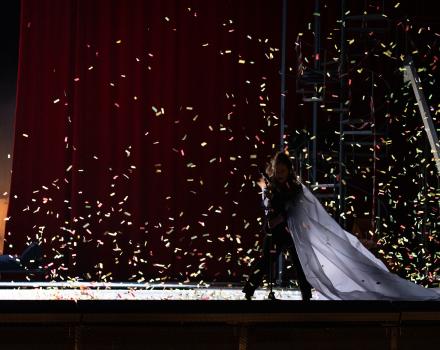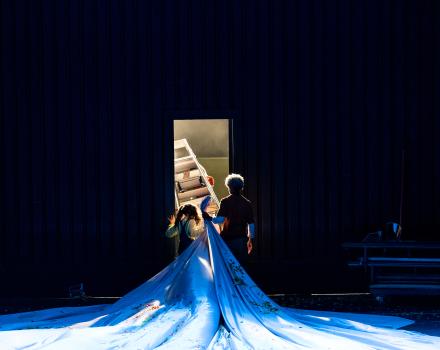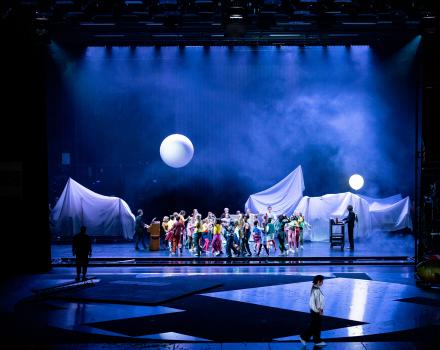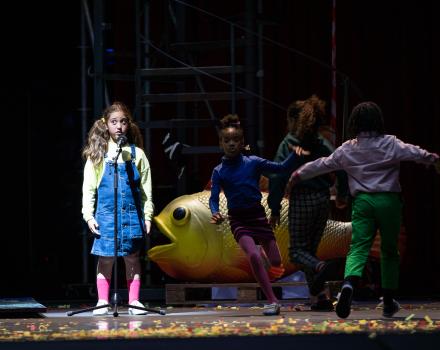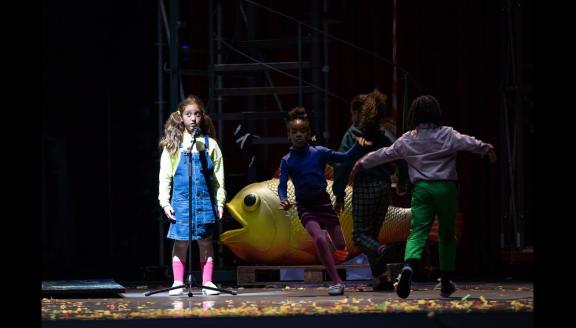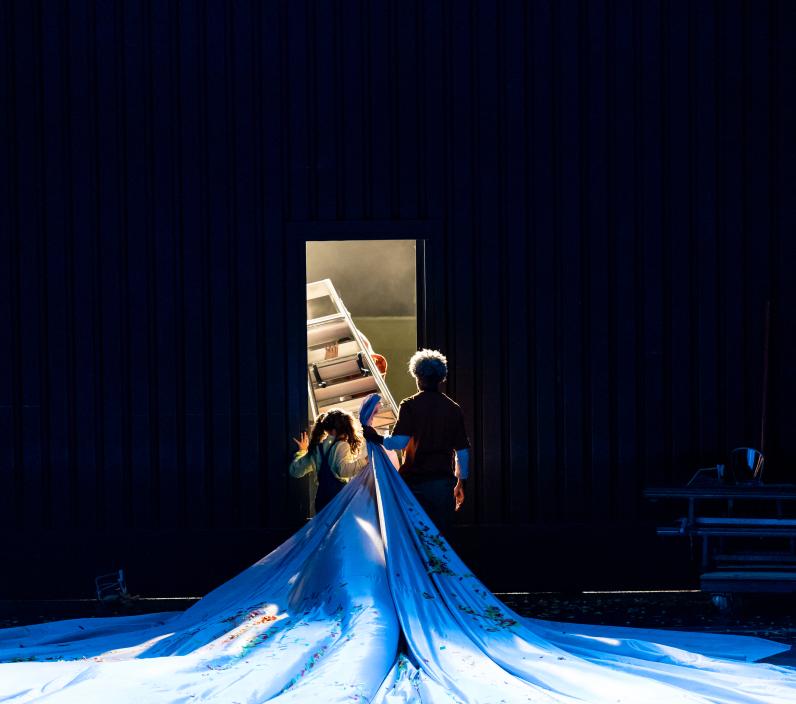

Taking Goethe's character as its starting point, FAUST [working title] is large-scale collage performance with chorus, orchestra, soloists and a wealth of music ranging from classical to lesser-known repertoire.
Dutch National Opera invites a new generation of music theatre makers to explore new landscapes in the world of music theatre. The result is a poetic, musical reflection on who we are and where we are going.
Cast
|
Principal / Soloists
|
Olga Busuioc, Polly Leech, Martin Mkhize, Fang Fang Kong
|
|---|---|
|
Performers
|
Alaaedin Baker, Renato Bertolino, Lidiane Moreira, Federica Panariello, Renzo Popolizio, François Vincent
|
|
Orchestra
|
The Netherlands Philharmonic Orchestra
|
|
Chorus
|
Chorus of Dutch National Opera, Nieuw Amsterdams Kinderkoor
|
|
Concept and creation
|
Lisenka Heijboer Castañon, Manoj Kamps, Niels Nuijten, Antonio Cuenca Ruiz, Hendrik Walther, Janne Sterke, Akim Moiseenkov
|
|
Compositions
|
Hector Berlioz, Arrigo Boito, Lili Boulanger, Emmanuel Chabrier, Julius Eastman, George Frederic Handel, Reinbert de Leeuw, Gustav Mahler, Florence Price, Franz Schubert, Chavela Vargas, Claude Vivier
|
|
Compositions and arrangements
|
Lochlan Brown, Bruno Coulais, Ravi Kittappa, Lingbo Ma, Florian Magnus Maier, Grace-Evangeline Mason, Martín Mayo, Marc Migó, Akim Moiseenkov, Vasile Nedea, serpentwithfeet, Thuthuka Sibisi, Rick van Veldhuizen, Maretha van der Walt
|
| ... | |
|
Conductor
|
Manoj Kamps
|
|---|---|
|
Director
|
Lisenka Heijboer Castañon
|
|
Sets
|
Janne Sterke, Hendrik Walther
|
|
Costumes
|
Janne Sterke
|
|
Light and video design
|
Hendrik Walther
|
|
Sound design
|
Akim Moiseenkov
|
|
Dramaturgy, adaptation
|
Antonio Cuenca Ruiz, Niels Nuijten
|
|
Dramaturgy consultants
|
MeLê Yamomo, Luc Joosten
|
|
Chorus master
|
Ching-Lien Wu
|
|
Children's chorus master
|
Anaïs de la Morandais
|
| ... | |
Video
The story
The summer of 2020. The world is in the grip of an unprecedented pandemic. The world as we know it stands under immense pressure.
The crisis has also impacted Dutch National Opera. The scheduled new production of Arrigo Boito’s Mefistofele, a large-scale opera based on Goethe’s Faust, cannot go ahead. Almost four years of preparation time – programming in the opera world happens far in advance – cannot culminate in a performance that had to open not only a new season, but also a new artistic era.
Against this background, Lisenka Heijboer Castañón and Manoj Kamps were asked to fill the empty space. Their assignment: take Goethe’s Faust as a starting point and make sure that the production is flexible, so that it can be adapted to changing measures and protocols.
In an artistic pressure cooker FAUST [working title] was created in just three months. The title was decided on when little was clear about the project, except that it could still go in all directions. Work in progress.
In addition to existing Faust repertoire, items from the personal musical archives of the artistic team and the performers have been included. The choices are personal, nestled in the bodies of those involved.
The musical world of FAUST [working title] is layered and polyphonic. The classical repertoire is present, next to lesser performed works. In addition, several contemporary composers have been asked to add their voices – no matter how loud or subtle – to these works.
Born out of limitations, FAUST [working title] is a performance that celebrates abundance.
The Programme
PROLOGO IN CIELO
(from Mefistofele)
Arrigo Boito & Martín Mayo
–
AIR D’HÉLÈNE
(from Faust et Hélène)
Lili Boulanger & Lochlan Brown
Performer: Polly Leech
–
PÂNĂ CÂND NU TE IUBEAM
(Romanian song)
Vasile Nedea
Performers: Olga Busuioc
–
ROMANCE DE L’ÉTOILE
(from Eighth symphony & L’étoile)
Gustav Mahler, Emmanuel Chabrier & Marc Migó
Performer: Martin Mkhize
–
VENTI, TURBINI
(from Rinaldo)
Georg Friedrich Händel & Rick van Veldhuizen
Performer: Polly Leech
–
PALOMA NEGRA
(recording)
Tomás Méndez & Chavela Vargas
–
LAKUTSHON’ ILANGA
Mackay Davashe, Miriam Makeba, Thuthuka Sibisi & Maretha van der Walt
Performer: Martin Mkhize
–
遠和近 FAR AND NEAR
(to a poem by Gu Cheng)
Lingbo Ma
Performer: Fang Fang Kong
–
MOON BRIDGE
Florence Price & Meriç Artaç
–
THE GENERATION
(to a poem by Gu Cheng) Lingbo Ma Sung by: Fang Fang Kong
–
L’ALTRA NOTTE IN FONDO AL MARE
(From Mefistofele)
Arrigo Boito & Grace-Evangeline Mason
Performer: Olga Busuioc
–
CERF-VOLANT
(From Les Choristes)
Bruno Coulais
–
FOUR ETHERS
(based on Symphonie Fantastique by Hector Berlioz, recording) serpentwithfeet
–
LONELY CHILD
Claude Vivier
Performer: Olga Busuioc
–
RIDDA E FUGA INFERNALE
(from Mefistofele)
Arrigo Boito & Florian Magnus Maier
–
WE WEAR THE MASK
Paul Laurence Dunbar
–
KOMM! HEBE DICH ZU HÖHEREN SPHÄREN
(from Eighth symphony)
Gustav Mahler & Lochlan Brown
Performer: Olga Busuioc
–
GRETCHEN AM SPINNRADE
Franz Schubert & Reinbert de Leeuw
Performers: Olga Busuioc, Polly Leech & Martin Mkhize
–
VITHIYIN KURAL
(based on Schicksalslied)
Johannes Brahms & Ravi Kittappa
–
JOY BOY
Julius Eastman
–
EPILOGUE
Akim Moiseenkov
Performers: Zeynep Ajar, Alaaedin Baker, Renato Bertolino, Olga Busuioc, Mary-Jane Franker, Polly Leech, Jonathan Lever, Martin Mkhize, Lidiane Moreira, Federica Panariello, Renzo Popolizio & François Vincent
Insights
5 things to know about FAUST [working title]
1° Work in progress
On a Sunday in late May 2020, while most artists around the world were in lockdown, director Lisenka Heijboer Castañón’s phone rang. It was Sophie de Lint, director of Dutch National Opera proposing Heijboer Castañón to open the opera house’s new season with an alternative production.
Given free rein to put her artistic team of young Netherlands-based theatre-makers together, Heijboer Castañón immediately knew that she wanted conductor, composer and theatre-maker Manoj Kamps on board. ‘I have a list of people I would very much like to work with. Manoj was at the top of that list.’ As the team grew and the project became increasingly collaborative, it became clear to Heijboer Castañón that they had to attempt something ‘completely different from what is normal for this opera house, because that was simply impossible’.
2° Literary inspiration
In regards to content, the only assignment for the young team was to weave in Goethe’s Faust, the figure that runs like a thread through Dutch National Opera's current programme. The German poet Johann Wolfgang von Goethe’s tragic play about the scholar Faust, who makes a pact with the Devil to exchange his soul for unlimited knowledge and pleasures, has inspired generations of artists from different disciplines, amongst them operas by Arrigo Boito, Charles Gounod and Hector Berlioz.
Heijboer Castañón and her team were less interested in engaging artistically with Faust’s deal with Devil. They were more drawn to his hunger for knowledge. ‘That did excite us: because what is knowledge? We also wondered about who decides what knowledge is worth acquiring and who are our teachers? We live in a world where we are again confronted with the fact that we cannot ‘know’ everything so we felt like we might want to open up the concept of what knowledge meant in Faust. Maybe knowledge is empathy, the sharing of stories and art.
It led them to explore different ways of gaining knowledge and they decided to have the combined knowledge of team and cast, inform the content of the performance.
3° Postcolonial voices
When Manoj Kamps joined the team, they brought along a new frame of reference. ‘For me, it is very natural to look at the world from a post-colonial perspective. I am quite literally a product of it, as a Sri Lankan-born child of Dutch adoptive parents, growing up in a British system. I carry all these colonial layers within me, and I have become more aware of this over the years - what that means, both for me and for society.’
4° A polyphonic feast
It was only natural that this multilayered approach should be reflected in each facette of the production. Musically, this meant that not everything sounds exactly as it was originally composed, sometimes centuries ago. As Kamps explains, starting from the idea of abundance, they wanted to allow alternative histories and possible futures to coexist, leading to the addition of new voices. Seeing that the music had to be rearranged so as to abide by safety measures in the orchestra pit, they made a virtue out of necessity.
Together with Heijboer Castañón, they invited no less than twelve different composers from all over the world to work on the project with them. Some were asked to stay close to the original, others to pull a work apart completely.
5° A breath of fresh air
From their individual performances to their singing by way of striking ensemble pieces such as when they are slipping down a huge slide to the music of Bruno Coulais' lullaby Cerf-volant, children play a central role in Heijboer Castañón’s stage concept. Exempt from the obligation of keeping a distance and wearing a mask, they alone are allowed to move freely on stage.
As their voice too, is added to the polyphony of voices represented, this production only gains in its open-ended and refreshing effect. As Bachtrack’s Michael Klier attests ‘Faust [working title] is an important contribution to the renewal of the genre of musical theatre: away from the museum right into the middle of social actuality.’
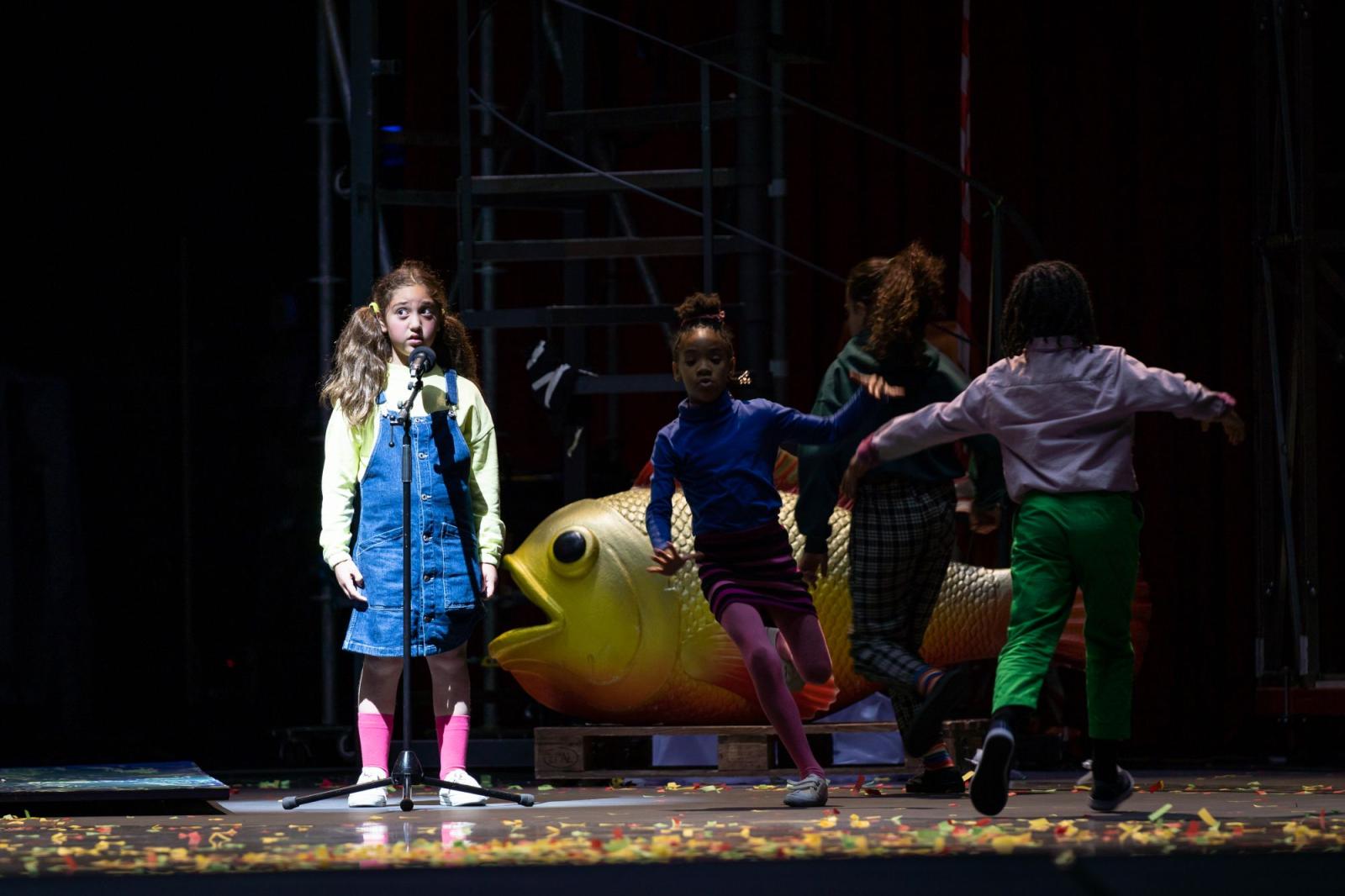
Gallery
